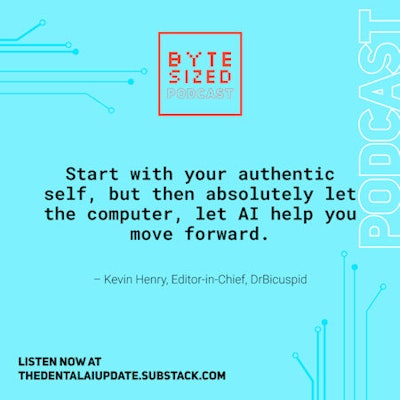I'll be honest with you, when Adrian Lefler asked me to join him on the Byte Sized podcast, I was curious where the conversation would go. After 25-plus years of writing and editing in this industry, I've seen a lot of trends come and go. But artificial intelligence? This one feels different.
And I'm seeing the effects firsthand in my inbox at DrBicuspid.com.
The AI problem nobody wants to talk about
 Kevin Henry.
Kevin Henry.
Here's what's happening ... I get submissions every week from dentists and dental professionals who want to share their expertise with our readers. That's great. That's what we're here for.
But lately, something's changed. I can spot it immediately now. Articles that are technically correct but have zero personality. No unique insights. No real experience shining through. Just ... content.
It's dental content slop, and frankly, it's becoming a problem.
Someone types, "Write me an article about dental implants," into ChatGPT, hits Enter, copies and pastes, and sends it in. No thought. No heart. No reason for anyone to trust what they're reading or care about who wrote it.
I reject those submissions every time.
Here's the thing about AI
I'm not against AI. Not even a little bit. I use it myself, both in dental publishing and when I'm covering the Colorado Rockies. But there's a right way and a wrong way to use these tools.
The wrong way? Letting the computer do your thinking for you.
The right way? Well, let me tell you what Adrian and I figured out independently.
The voice-to-text game-changer
This is going to sound almost too simple, but just stay with me.
Use your phone. Just talk.
When I'm covering a game, I'm down in the clubhouse talking to players. It's literally me and my phone. I use Otter for transcription, and by the time I walk from the clubhouse to the press box, the tool has already cleaned up my grammar and organized my quotes. I Airdrop it to my computer, and I'm ready to write.
That's hours of work, compressed into minutes. But here's the key: It started with me. My questions. My conversations. My authentic interactions with the players.
Adrian Lefler does something similar with his dental marketing content. He opens Claude and talks for 2,000 words. Then he tells the AI to structure it into a proper blog format.
Think about this: You're a dentist driving home after a long day. Instead of sitting in silence or listening to the same podcast again, pull out your phone. Tell a patient story. Talk through a challenging case you just solved. Describe that moment when a patient thanked you in a way that reminded you why you became a dentist in the first place.
That's authentic content. That's content only you can create. The AI just helps you polish it.
Your personal writing style guide
Adrian showed me something I hadn't thought of before, and it's pretty clever.
You can create a personalized AI project that actually captures how you write. You take a personality test, save the results. Gather some of your best writing, maybe some video transcripts where you're speaking naturally. Upload all of it to Claude or whatever AI tool you prefer.
Then you have the AI create a style guide based on your materials.
It captures everything. Your metaphors. Your sense of humor (or lack thereof). How you explain complex ideas. Your sentence structure. All of it. Now, when you dump your thoughts into that project, the AI doesn't just organize them, it structures them in your voice. The output sounds like you, just more polished. And a lot faster.
AI as your assistant, not your replacement
Here's what I told Adrian, and I mean this: "I think the biggest use of AI whenever it comes to journalism, whenever it comes to content creation today is to start with your authentic self, but then absolutely let the computer, let AI help you forward."
That's the difference between good content and garbage.
I bring 25 years of relationships, sources, and industry knowledge to everything I write. The AI helps me get past writer's block. It tightens my sentences. It catches my grammar mistakes. But it doesn't replace my expertise or my voice.
The dental professionals winning at content creation right now understand this distinction. They're not avoiding AI. They're not letting AI do all their thinking either. They're using it strategically to get their authentic voice out there more often, without burning out.
What's coming next
I'm excited about what's ahead, particularly with video. AI-generated video is getting scary good. That opens up huge opportunities for dental practices to tell their stories in ways that weren't possible before.
YouTube videos and social media content already dominate search results. As AI makes video creation easier, the practices that figure this out early will own their local markets.
But authenticity will still matter. Actually, it will matter more than ever. The practices that use AI to amplify their genuine expertise will crush the competitors churning out generic nonsense.
Adrian said something interesting. If he were rebuilding My Social Practice from scratch today, he'd do a two-hour video interview with each doctor and generate everything from that. All the website content, blog articles, even automated review responses in the doctor's voice. Just from one authentic conversation.
No tricks. No magic search engine optimization (SEO) formulas. Just authentic conversations, properly leveraged.
What you should do
If you're feeling overwhelmed by all this AI stuff, here's my advice.
Start small. Start authentic. Pull out your phone during your commute tomorrow. Tell a patient story. Share what frustrated you about a case and how you figured it out. Explain that technique you've refined over the years that nobody else does quite the same way.
Just talk. Be yourself.

Then use AI to help you turn those thoughts into polished, SEO-optimized content that's ready to publish. You're not replacing your expertise. You're making your expertise more accessible to the patients who need to hear it.
Final thoughts
I'm grateful Adrian invited me on Byte Sized. It gave me a chance to think through how I'm using these tools and why some approaches work while others fail miserably.
The future of content creation isn't about choosing between human creativity and AI. It's about using both strategically. It's about being more authentically yourself, at scale, without sacrificing your weekends or your sanity.
After 25 years in this industry, that's the most exciting development I've seen. Not because the technology is cool (though it is) but because it finally gives good people a way to share their expertise without burning out in the process.
If you haven't listened to the full episode yet, check it out below. Adrian and I covered even more ground, and I think you'll find some ideas you can use right away.
Now if you'll excuse me, I've got a baseball game to cover.



















